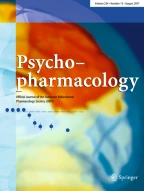Abstract
Using a double-blind cross-over design, the effect of methylphenidate on the performance of 23 hyperactive children on four tasks measuring different aspects of attention was investigated. While receiving methylphenidate the hyperactive children showed a significant improvement in all aspects of their performance which had, in comparison to a control group of normal children, been initially impaired. Furthermore, methylphenidate produced a significant improvement in performance in those behaviours which had not been initially impaired.
Similar content being viewed by others
References
Bills, A. G.: Blocking: a new principle of mental fatigue. Amer. J. Psychol. 43, 230–245 (1931).
—: A study of blocking and other response variables in psychotic, brain-damaged and personality-disturbed patients. Behav. Res. Ther. 2, 99–106 (1964).
Broadbent, D. E.: Perception and communication. New York: Pergamon Press 1958.
Campbell, S., Douglas, V., Morgenstern, G.: Cognitive styles in hyperactive children and the effect of methylphenidate. Paper read at Canadian Psychological Association Annual Meeting, Toronto, June 1969.
Cohen, N., Douglas, V., Morgenstern, G.: Psychophysiological concomitants of hyperactivity in children. Paper read at Canadian Psychological Association Annual Meeting, Toronto, June 1969.
Conners, C. K., Eisenberg, L., Sharpe, L.: Effects of methylphenidate (Ritalin) on paired-associate learning and Porteus Maze performance in emotionally disturbed children. J. cons. Psychol. 28, 14–22 (1964).
Eisenberg, L.: The management of the hyperkinetic child. Develop. Med. Child Neurol. 8, 593–598 (1966).
Knights, R. M., Hinton, G.: The effects of methylphenidate (Ritalin) on the motor skills and behaviour of children with learning problems. J. nerv. ment. Dis. 148, 643–653 (1969).
Kornetsky, C.: Psychoactive drugs in the immature organism. Psychopharmacologia (Berl.) 17, 105–136 (1970).
Laufer, M. W., Denhoff, E.: Hyperkinetic behavior syndrome in children. J. Pediat. 50, 463–474 (1957).
Millichap, J. G., Fowler, G. W.: Treatment of minimal brain dysfunction syndrome. Selection of drugs for children with hyperactivity and learning disabilities. Pediat. Clin. N. Amer. 14, 767–777 (1967).
Rosvold, H. E., Mirsky, A. F., Sarason, I., Bransome, E. D., Beck, L. H.: A continuous performance test of brain damage. J. cons. Psychol. 20, 343–350 (1956).
Sprague, R. L., Barnes, K. R., Werry, J. S.: Methylphenidate and thioridazine: learning, reaction time, activity and classroom behavior in disturbed children. Amer. J. Orthopsychiat. 40, 615–628 (1970).
Sykes, D. H., Douglas, V. I., Morgenstern, G.: Sustained attention in hyperactive children. Unpublished study, McGill University 1970.
— —, Weiss, G., Minde, K. K.: Attention in hyperactive children and the effect of methylphenidate (Ritalin). J. Child Psychol. Psychiat. 12, 129–139 (1971).
Wechsler, D.: Wechsler intelligence scale for children. New York: Psychological Corporation 1949.
Werry, J. S.: Developmental hyperactivity. Pediat. Clin. N. Amer. 15, 581–599 (1968).
Winer, B. J.: Statistical principles in experimental design. New York: McGraw Hill 1962.
Author information
Authors and Affiliations
Additional information
This study was part of a thesis submitted to McGill University by the first author in partial fulfillment of the requirements for the Ph. D. degree. The research was supported by research grants from the Medical Research Council (No. Ma — 1577 to Dr. V. I. Douglas) and the Ciba Pharmaceutial Company of Dorval, Quebec.
Rights and permissions
About this article
Cite this article
Sykes, D.H., Douglas, V.I. & Morgenstern, G. The effect of methylphenidate (Ritalin) on sustained attention in hyperactive children. Psychopharmacologia 25, 262–274 (1972). https://doi.org/10.1007/BF00422506
Received:
Issue Date:
DOI: https://doi.org/10.1007/BF00422506
